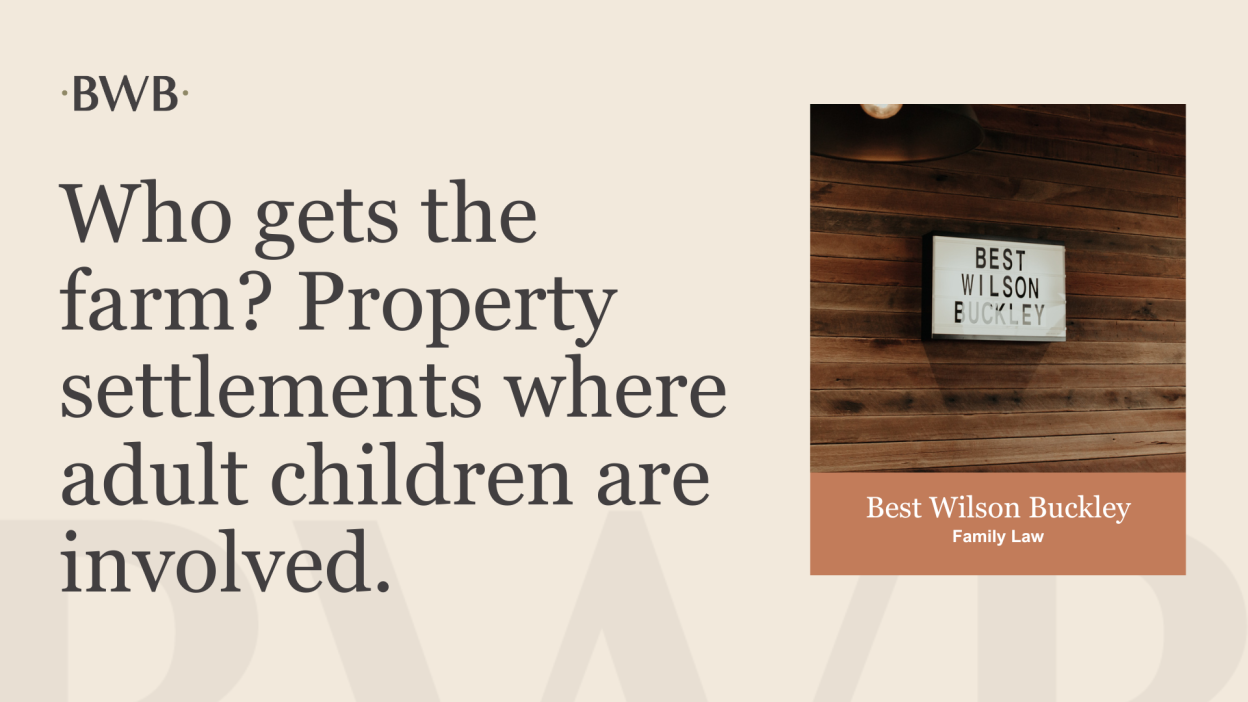Who Gets the Farm? Property settlements where adult children are involved
By Best Wilson Buckley Family Law |16 April 2023 |Financial and Property Settlements-Articles

Consider a scenario where the next generation son or daughter that is now an adult has been working on the property owned by their parents for many years for limited financial return. There has always been the promise that by working on the property rather than pursuing a life and employment elsewhere, one day the family property will be passed to them. However, before the time comes when the farm is to be transferred to the next generation, the parent’s separate and need to resolve their own property settlement in a way that properly reflects the contributions that the parent’s themselves have made over many years. The son or daughter is then left in the precarious position where their work may go unrecognised if the promise of the ownership of the farm is left unfulfilled. The arrangement which seemed to work so well when the family was intact now presents a difficult balancing between the property rights of the parents on the one hand and the legitimate promises made to the adult child on the other.
In property law, identifying the legal owner of the property is the starting point and a quick search of the land title records will confirm the current legal owners. In many situations, that is where the ownership issue ends.
There are, of course, exceptions, and in the case of rural farming properties, the exceptions occur more frequently than you might expect and the impending transfer of a farming property from one generation to the next is common.
There is a separate body of law outside of the family law process which recognises that in some situations the “legal” owner of a property may have done things or encouraged other people to believe that the legal ownership would not be relied on and that really the property belonged to them. If the legal owner is able to rely on their ownership of the property to sell up everything as part of their property settlement and give nothing back to the son or daughter that improved the farm by their own labour, it could result in an incredibly unfair outcome.
The body of law that has been developed over many years to overcome that unfairness is referred to as the law of equity. It is not like the Family Law Act that has been written by parliament. Rather, it has been built up over many years by judges deciding cases where legal principles have been established to arrive at fair outcomes and which prevent legal owners from going back on their promises in a way which would be unconscionable.
The reality is that in farming cases, we often see a situation where the legal interest in the farm is sought to be challenged by an adult child to reflect what has already been substantial contributions over many years based on the promise of future ownership.
In the Federal Circuit and Family Court of Australia, the court can, in appropriate circumstances, hear from and permit an adult child who has made contributions to the farming property to be joined in their own right as a party to the proceedings between their parents.
In practice, this means that rather than having to go to two separate courts where on the one hand a child and their parents are required to deal with the law of equity and the parents must then go to a different court to determine their property settlement under the Family Law Act, the one court can deal with both matters at the same time.
Such an approach makes a lot of sense where the intertwining of the family relationship, property, and the matters that need to be considered are all part of the same dispute. The same judge can hear the full story from everybody and then work out what should happen by applying the different law which applies to the property settlement between parents and the law of equity which relates to the interests of those third parties.
Again, what is most important is the facts and circumstances of each individual matter and how those facts are likely to be taken into account. Where there are third party rights involved, obtaining quality independent legal advice at an early stage can make a very big difference to the end outcome.
What is clear is that if there are competing rights of parents and adult children when parents separate, they can be resolved through one process at considerably less expense and delay.